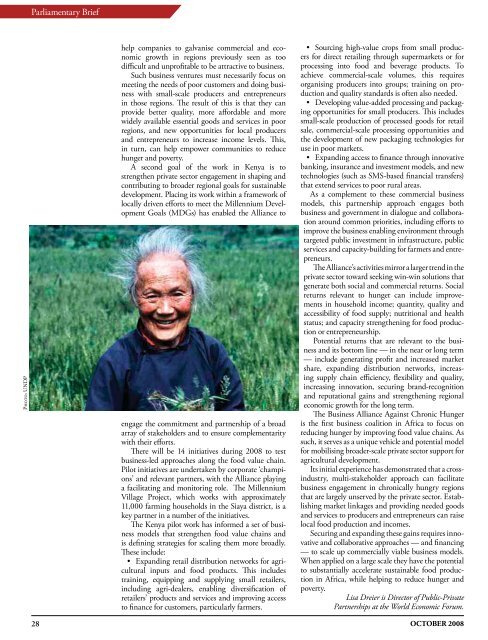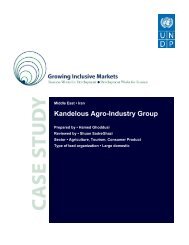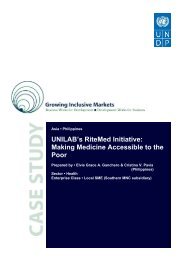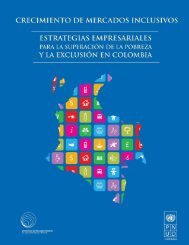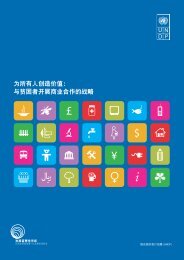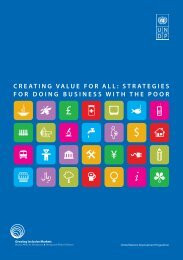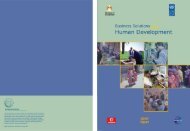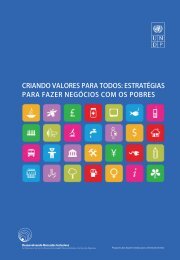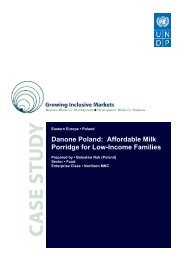Meet the consumer today's business needs to targe
Meet the consumer today's business needs to targe
Meet the consumer today's business needs to targe
- No tags were found...
You also want an ePaper? Increase the reach of your titles
YUMPU automatically turns print PDFs into web optimized ePapers that Google loves.
Parliamentary BriefPho<strong>to</strong>: UNDPhelp companies <strong>to</strong> galvanise commercial and economicgrowth in regions previously seen as <strong>to</strong>odifficult and unprofitable <strong>to</strong> be attractive <strong>to</strong> <strong>business</strong>.Such <strong>business</strong> ventures must necessarily focus onmeeting <strong>the</strong> <strong>needs</strong> of poor cus<strong>to</strong>mers and doing <strong>business</strong>with small-scale producers and entrepreneursin those regions. The result of this is that <strong>the</strong>y canprovide better quality, more affordable and morewidely available essential goods and services in poorregions, and new opportunities for local producersand entrepreneurs <strong>to</strong> increase income levels. This,in turn, can help empower communities <strong>to</strong> reducehunger and poverty.A second goal of <strong>the</strong> work in Kenya is <strong>to</strong>streng<strong>the</strong>n private sec<strong>to</strong>r engagement in shaping andcontributing <strong>to</strong> broader regional goals for sustainabledevelopment. Placing its work within a framework oflocally driven efforts <strong>to</strong> meet <strong>the</strong> Millennium DevelopmentGoals (MDGs) has enabled <strong>the</strong> Alliance <strong>to</strong>engage <strong>the</strong> commitment and partnership of a broadarray of stakeholders and <strong>to</strong> ensure complementaritywith <strong>the</strong>ir efforts.There will be 14 initiatives during 2008 <strong>to</strong> test<strong>business</strong>-led approaches along <strong>the</strong> food value chain.Pilot initiatives are undertaken by corporate ‘champions’and relevant partners, with <strong>the</strong> Alliance playinga facilitating and moni<strong>to</strong>ring role. The MillenniumVillage Project, which works with approximately11,000 farming households in <strong>the</strong> Siaya district, is akey partner in a number of <strong>the</strong> initiatives.The Kenya pilot work has informed a set of <strong>business</strong>models that streng<strong>the</strong>n food value chains andis defining strategies for scaling <strong>the</strong>m more broadly.These include:• Expanding retail distribution networks for agriculturalinputs and food products. This includestraining, equipping and supplying small retailers,including agri-dealers, enabling diversification ofretailers’ products and services and improving access<strong>to</strong> finance for cus<strong>to</strong>mers, particularly farmers.• Sourcing high-value crops from small producersfor direct retailing through supermarkets or forprocessing in<strong>to</strong> food and beverage products. Toachieve commercial-scale volumes, this requiresorganising producers in<strong>to</strong> groups; training on productionand quality standards is often also needed.• Developing value-added processing and packagingopportunities for small producers. This includessmall-scale production of processed goods for retailsale, commercial-scale processing opportunities and<strong>the</strong> development of new packaging technologies foruse in poor markets.• Expanding access <strong>to</strong> finance through innovativebanking, insurance and investment models, and newtechnologies (such as SMS-based financial transfers)that extend services <strong>to</strong> poor rural areas.As a complement <strong>to</strong> <strong>the</strong>se commercial <strong>business</strong>models, this partnership approach engages both<strong>business</strong> and government in dialogue and collaborationaround common priorities, including efforts <strong>to</strong>improve <strong>the</strong> <strong>business</strong> enabling environment through<strong>targe</strong>ted public investment in infrastructure, publicservices and capacity-building for farmers and entrepreneurs.The Alliance’s activities mirror a larger trend in <strong>the</strong>private sec<strong>to</strong>r <strong>to</strong>ward seeking win-win solutions thatgenerate both social and commercial returns. Socialreturns relevant <strong>to</strong> hunger can include improvementsin household income; quantity, quality andaccessibility of food supply; nutritional and healthstatus; and capacity streng<strong>the</strong>ning for food productionor entrepreneurship.Potential returns that are relevant <strong>to</strong> <strong>the</strong> <strong>business</strong>and its bot<strong>to</strong>m line — in <strong>the</strong> near or long term— include generating profit and increased marketshare, expanding distribution networks, increasingsupply chain efficiency, flexibility and quality,increasing innovation, securing brand-recognitionand reputational gains and streng<strong>the</strong>ning regionaleconomic growth for <strong>the</strong> long term.The Business Alliance Against Chronic Hungeris <strong>the</strong> first <strong>business</strong> coalition in Africa <strong>to</strong> focus onreducing hunger by improving food value chains. Assuch, it serves as a unique vehicle and potential modelfor mobilising broader-scale private sec<strong>to</strong>r support foragricultural development.Its initial experience has demonstrated that a crossindustry,multi-stakeholder approach can facilitate<strong>business</strong> engagement in chronically hungry regionsthat are largely unserved by <strong>the</strong> private sec<strong>to</strong>r. Establishingmarket linkages and providing needed goodsand services <strong>to</strong> producers and entrepreneurs can raiselocal food production and incomes.Securing and expanding <strong>the</strong>se gains requires innovativeand collaborative approaches — and financing— <strong>to</strong> scale up commercially viable <strong>business</strong> models.When applied on a large scale <strong>the</strong>y have <strong>the</strong> potential<strong>to</strong> substantially accelerate sustainable food productionin Africa, while helping <strong>to</strong> reduce hunger andpoverty.Lisa Dreier is Direc<strong>to</strong>r of Public-PrivatePartnerships at <strong>the</strong> World Economic Forum.28OCTOBER 2008


